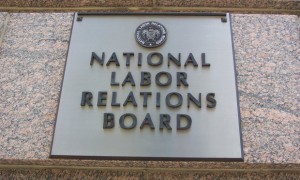
By Mark Gruenberg
Editor PAI
Washington (PAI) – It’s been a busy year at the National Labor Relations Board.
The five-member board, which rules on most labor-management relations and disputes in the U.S., had – after years of controversy, Republican filibusters, and court cases – reached full strength, until Aug. 27. Led by its chairman, Mark Gaston Pearce, a Buffalo-area labor lawyer, the board responded with a series of rulings important to workers.
The highest-profile ones were two of the most recent cases.
JOINT-EMPLOYERS
In one, Browning-Ferris Inc., and Leadpoint Business Services vs. Teamsters Local 350, the board updated and modernized its definition of “joint employers” to declare that corporations and their franchisees – think McDonald’s – are jointly responsible for obeying labor law at the local franchises and/or subcontractors.
That lets the workers at the local franchises organize and bargain, too, while ensuring that when they sit down to negotiate, they’re bargaining with someone on the other side with the power to make decisions and not be overruled – because both of the employers must be sitting on the other side of the table.
The immediate issue in the Leadpoint case was that Local 350 ran a recognition campaign 14 months ago, but the battle over joint employers led to impoundment of the ballots. When they were opened in early September, the union had won.
STUDENT ATHLETE EMPLOYEES
The other top ruling was when the board decided not to decide, in so many words, in the celebrated case of the Northwestern University football players who want to unionize. The NLRB’s Chicago regional director ruled the players are employees and the coaches and the university their employer, so the players could unionize and bargain over such things as medical treatment, the value of college scholarships and working conditions.
But the board ruled, 5-0, that it lacked jurisdiction over the case. It also said that even if it had ruled for the players, there would not be uniform application of the rule across college athletics, because only 17 of the 125 colleges in Northwestern’s group – the top football and basketball schools in NCAA Division I – are private. The rest are public universities.
As the Northwestern case shows, workers haven’t won every time at the NLRB.
FREE RIDERS
In another case, they lost an opportunity when a Florida paper company and the Steelworkers reached a settlement that resulted in a potentially important case being withdrawn.
The claim that started the case was resolved with a settlement. The case would have let the board rule on whether unions could charge “free riders” item by item for such things as handling grievances, rather than giving them free rides. Had the board taken it, it could have affected the so-called right-to-work movement, too.
Predictably, many board rulings draw praise from workers and their allies and caterwauling from plutocrats, the radical right and their political puppets.
In the latest repeat of a frequent scenario, a coalition of low-wage employers is now wining and dining the Republican-run 114th Congress to overturn the Browning-Ferris joint employer ruling. GOP leaders of congressional labor committees introduced bills Sept. 9 to overturn it, too.

